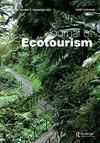自然旅游中的可持续游客体验设计——特刊简介
IF 2.4
Q2 HOSPITALITY, LEISURE, SPORT & TOURISM
引用次数: 2
摘要
体验是以自然为基础的旅游业的核心——如果没有良好的体验,需求就会减少,因此,以自然为中心的旅游业就会受到影响。然而,基于自然的旅游社区并没有决定游客的体验,因为这些体验是在游客的脑海中构建的,而是为游客创造和安排了这样做的条件。因此,本期特刊旨在将设计可持续的基于自然的旅游体验机会的挑战带到基于自然的旅行研究的前沿。自然和文化遗产是基于自然的旅游体验的核心,也是这些体验机会的起点;但是,正如本卷中的研究所表明的那样,高质量的体验往往不仅仅依赖于传统。正如我们在最初的论文征集中所指出的,以自然为基础的旅游业是旅游业、户外娱乐活动和自然区域的交叉点。由于它对经济和自然环境的重要性,我们需要更好地了解它的可持续性,它需要什么,以及如何设计和实施高质量的体验机会。要做到这一点,我们需要增强测量工具和方法,了解体验质量与保护目标之间的关系,向社区传递利益,以及有关自然特征和过程的知识。了解对营业收入的影响以及供应商对自然旅游业相对于自然主导地区其他潜在用途的看法也至关重要。事实上,知识差距是巨大的;但我们对人际关系的理解仍然相对较少。Mandić和McCool(2022)对过去十五年的经验设计研究进行了盘点和评估,并提出了从这一时期的研究中吸取的十个重要教训。本文为以下案例提供了一个总体背景,说明了在理解为基于自然的旅游体验提供创新机会并评估其成功时,基于自然的旅行所采取的各个维度。识别体验的组成部分对于设计机会至关重要。例如,Spring(2022)对基于自然的游客体验的动机和维度进行了创造性的研究。此外,了解经验机会是否令人满意对于适应性地管理这些经验机会也是至关重要的。例如,Sivakami等人(2022)报道了在印度Eravikulam国家公园开发影响管理模型,以解决对整体体验产生负面影响的因素。忠诚度已成为衡量满意度的一种方法。基于独特的语境,包括Mock等人(2022)和Dybsand等人(2021)在内的两篇论文深入了解了这一方法,并解释了这一概念的语境依赖性。在访问者的设计、实施和评估过程中,各种设计考虑因素都会发挥作用。基于自然的游客体验不仅为游客带来结果,也为资源和社会系统带来结果。Lengieza等人(2022)认为,参与基于自然的旅游会产生特定的心理结果,从而更好地了解体验中涉及的自然和社会系统,本文章由计算机程序翻译,如有差异,请以英文原文为准。
Sustainable visitor experience design in nature-based tourism: an introduction to the Special Issue
Experiences are at the heart of nature-based tourism – without good experiences, demand dwindles, and as a result, the nature-based tourism industry suffers. However, the naturebased tourism community does not dictate visitor experiences, as these are constructed in visitors’ minds, but instead sets up and arranges the conditions for visitors to do so. Thus, the current Special Issue was designed to bring to the forefront of nature-based tourism research the challenges of designing sustainable nature-based tourism experience opportunities. Natural and cultural heritage is at the heart of the nature-based tourism experience, and that is where these experience opportunities begin; but, as the research in this volume shows, quality experiences are often dependent on more than that heritage. As we noted in our original call for papers, nature-based tourism stands at the intersection of tourism, outdoor recreational activities and natural areas. Because of its importance to economies and the natural environment, we need a better understanding of its sustainability, what it entails, and how quality experience opportunities can be designed and implemented. To do this, we need enhanced measurement tools and methodologies, as well as an understanding of the relationships between experience quality and conservation goals, the transmission of benefits to communities, and knowledge about natural features and processes. Understanding the implications for operating revenue and the providers’ perspective on nature-based tourism vis-à-vis other potential uses of nature-dominated areas is also critical. Indeed, the knowledge gap is enormous; but our understanding of relationships is still relatively small. Mandić andMcCool (2022) deliver the inventory and assessment of the last fifteen years of the experience-design research and suggest ten significant lessons learned from research over this period. This paper provides an overall context for the following cases, illustrating the various dimensions nature-based tourism takes when understanding what is involved in delivering innovative opportunities for nature-based tourism experiences and assessing their success. Identifying an experience’s components is essential to designing opportunities. For example, Spring (2022) provides creative looks into the motivations and dimensions of nature-based visitor experiences. Further, understanding if experience opportunities are satisfying is also essential to managing such experience opportunities adaptively. For example, Sivakami et al. (2022) reported on developing an impact management model in Eravikulam National Park in India to tackle the factors affecting overall experiences negatively. Loyalty has become one method of measuring satisfaction. Relying on unique contexts, two papers, including Mock et al. (2022) and Dybsand et al. (2021), provide insights into this methodology and explain the contextual dependence of the concept. Various design considerations come into play during the visitor design, implementation and evaluation process. Nature-based visitor experiences result in outcomes not just for the visitor but also for the resource and social systems. Lengieza et al. (2022) argue that participation in nature-based tourism leads to specific psychological outcomes, leading to a greater appreciation of the natural and social systems involved in the experience and,
求助全文
通过发布文献求助,成功后即可免费获取论文全文。
去求助
来源期刊

Journal of Ecotourism
Social Sciences-Geography, Planning and Development
CiteScore
6.40
自引率
12.50%
发文量
32
期刊介绍:
The Journal of Ecotourism seeks to advance the field by examining the social, economic, and ecological aspects of ecotourism at a number of scales, and including regions from around the world. Journal of Ecotourism welcomes conceptual, theoretical, and empirical research, particularly where it contributes to the dissemination of new ideas and models of ecotourism planning, development, management, and good practice. While the focus of the journal rests on a type of tourism based principally on natural history - along with other associated features of the man-land nexus - it will consider papers which investigate ecotourism as part of a broader nature based tourism, as well as those works which compare or contrast ecotourism/ists with other forms of tourism/ists.
 求助内容:
求助内容: 应助结果提醒方式:
应助结果提醒方式:


